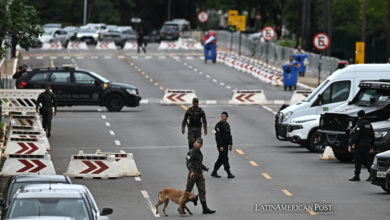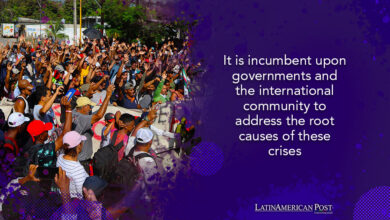Academic Censorship in Brazil is A Covert Attack on Right-Wing Free Speech
The Federal Federal University of Rio de Janeiro's new dictionary analyzing right-wing expressions is not a neutral academic endeavor but a subtle yet significant assault on freedom of speech, aiming to delegitimize and suppress right-wing ideology under the guise of linguistic analysis.

Photo: LatinAmerican Post
Latin American Post Staff and EFE
Escucha este artículo
Leer en español: Censura académica en Brasil atenta contra la libertad de expresión de la derecha
Analyzing Linguistic Bias: UFRJ's Controversial Dictionary
The recent publication of a dictionary by linguistics researchers at the Federal University of Rio de Janeiro (UFRJ), which claims to analyze "ambiguous" expressions used by the Brazilian far-right, is more than just an academic endeavor. It represents a direct attack on freedom of speech and a veiled attempt to undermine right-wing ideology. This dictionary, developed in collaboration with the Sexuality and Politics Observatory (SPW), is not a neutral linguistic tool but a politically motivated document designed to delegitimize certain viewpoints and languages under the guise of academic analysis.
The project's stated aim is for readers to understand the history and evolution of the terms, allowing them to decide if they should use these expressions in their vocabulary. However, this objective is inherently biased. By singling out expressions predominantly used by the right-wing, such as 'neutral language,' 'good citizen,' and 'identitarianism,' the dictionary subtly implies that these terms are inherently problematic or dangerous. This is a classic tactic of ideological suppression: framing the language of your opponents as ambiguous or controversial, thereby discouraging its use.
For example, the term' good citizen,' which the dictionary claims, has been used by Bolsonarism to differentiate behaviors between "supposed bandits and the general population." The authors argue that its popularization was "a fundamental part of the process that brought the far-right to power." This interpretation not only simplifies a complex political phenomenon but also demonizes a phrase that, in many contexts, is innocuous or even positive.
Similarly, examining the word 'family' and its implications in public debate must be revised. The dictionary suggests that the term has been co-opted to blame feminists and LGBTI+ activists for its "destruction." However, this perspective must acknowledge that many people genuinely believe in the importance of traditional family values without malicious intent toward these groups. The dictionary's approach risks pathologizing a legitimate point of view, effectively silencing those who hold it.
Questioning Ideological Imposition
The creators of this dictionary claim to unveil the origins and purposes of these terms, suggesting that they have always existed unquestioned. Yet, this very act of questioning is a form of ideological imposition. By dissecting and critiquing the language of the right-wing, the dictionary implicitly positions itself as an arbiter of linguistic legitimacy. This is not the role of academia. Academic work in linguistics should aim to understand and explain language use, not to pass judgment on its political appropriateness.
Furthermore, the dictionary's availability in both an academic format and a simplified version for dissemination among young people raises concerns about indoctrination. By targeting the youth with this material, the project is more about shaping political opinions than fostering genuine linguistic understanding. This is particularly alarming given the educational setting in which this material is being disseminated.
Also read: Racism in Soccer: Brazilian Judge Takes Firm Stand Against Argentina Fan's Insults
With six new expressions added to the eight previously analyzed terms like 'ideology' and 'patriotism,' this second edition continues to expand its scope. However, the expansion of this project only serves to widen the net of linguistic censorship. The inclusion of terms like 'patriotism,' a concept that is central to many conservative ideologies, is especially concerning. By framing such a fundamental concept as ambiguous, the dictionary undermines the core values of many right-wing individuals and movements.
A Threat to Free Speech: Conclusion
In conclusion, the UFRJ's dictionary is a concerning development for anyone who values free speech and the diversity of political thought. It represents a covert effort to delegitimize and diminish right-wing ideology by framing its language as ambiguous and problematic. In a genuinely free society, all political ideologies should have the right to express themselves without fear of being undermined by academic institutions. Rather than contributing to the understanding of language, this dictionary risks becoming a tool for ideological control.




